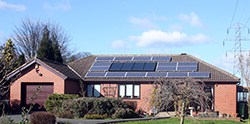DIY Photovoltaic Solar Panels for Your Home Heating
With the cost of solar panels due to fall and them lasting now up to 40 years it might be time to think about installing them in your home.
Certainly technology has improved immensely and the panels you use for your home heating requirements or electricity are far superior to the small lights that people sell for your garden.
You can get cheap DIY photovoltaic solar panels or have a professional to install them for you and these are the large black looking panels that are on houses roofs pointing directly to the sun. There are still some grants available from the government for you to have them installed and the great thing is that the national grid can buy back any energy you produce and don’t actually use.
Benefits of photovoltaic solar panels
 The best part of installing a solar panel in your home is that you are generating completely free energy from your home from a free source ie: the sun. There is no burning of coal or the need to build a nuclear power station and you’ll be 100% self sufficient. Once installed there is usually no maintenance costs involved and there are no moving parts as such so there is no noise produced.
The best part of installing a solar panel in your home is that you are generating completely free energy from your home from a free source ie: the sun. There is no burning of coal or the need to build a nuclear power station and you’ll be 100% self sufficient. Once installed there is usually no maintenance costs involved and there are no moving parts as such so there is no noise produced.
There is also no planning permission required in England by you to add them to your home (although there are restrictions in Wales and Northern Ireland) and these work all year round. The average home required 3300 kwh of electricity per year and a 1kwh photovoltaic solar panel produces around 750 kwh per year whilst a 5kwh panel produces 4500 kwh per year which would be ample for most homes.
How they work
Although solar panels work best in direct sunlight they still generate electricity even on a cloudy day. However, these are not light and your roof must be of a sturdy quality to take the weight of a panel or several panels if required. There are some types of installation that don’t need to be on a roof and can be at the end of your garden so long as they have a direct uninterrupted sight of the sun during the day. These are then connected via cables into your home. They can also be fixed to a heat pump to produce hot water for central heating or just for water.
The panels are made up of cells usually of silicon and is a semiconducting material so that when sunlight shines upon them they produce an electric field across the cells and the stronger the sunlight the more electricity is produced.
Cost of installation
Whilst the cost of producing and installing solar panels is likely to reduce over time you need to be careful on where you purchase the panels and who you get to install them. If you can get a recommendation from someone then this is best. There are cheap alternatives on the market but these may not last the 30+ years that the higher quality ones do.
General cost of installation appears to be around the £10,000 mark although there are grants currently available but these may not last forever. Some DIY stores are also selling them but you’ll need to install them yourself or get a qualified electrician who knows how to do this. If you chose the DIY route the cost of purchasing a 1kwh panel is around the £3000 mark.